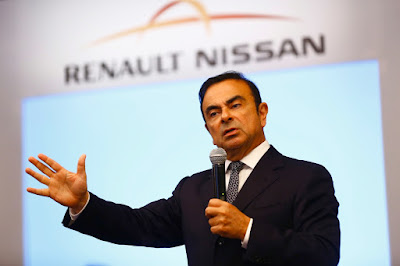An Update on Carlos Ghosn
The title of this last of three posts today is a little
misleading, because it would probably need a dedicated team to keep up-to-date
on the case of Carlos Ghosn. In November 2018 we heard from Oluwarotimi
Adeniyi-Akintola of Aston Law School how Carlos Ghosn had been accused of financial improprieties and the falsification of securities reports or, as The Independent put it, Nissan
had found that he had engaged in the personal use of company money and had
under-reported his income in violation of Japanese law. However, since
then, the case has taken an almost soap-opera style turn and today, in front of
a packed room of reporters in Lebanon, the former Chair of the Nissan Alliance
put forward his case as to why he had circumvented the conditions of
his House Arrest in Japan and fled to Lebanon.
After being charged by Japanese authorities last year, Ghosn
had posted a £6.8 million bail in April. Owing to his abilities and
connections, the bail deal was structured so that he was to be monitored by a
24-hour camera inside his house, that his use of technology was to be
restricted, and that he was to be banned from travelling abroad – his passports
were to be kept at the offices of his Lawyers in Japan. However, in a statement
emanating from Lebanon on New Year’s Eve, Ghosn declared ‘I have escaped injustice and
political persecution’. Ghosn was born in Brazil to parents of Lebanese
descent and, crucially, there is no extradition agreement between Lebanon and
Japan. How he managed to escape Japan has been the subject of much debate in
the New Year. Although Ghosn today did not confirm how, suggestions have been put
forward that he was smuggled
through an airport in a musical equipment case to a private jet, by a private
security firm that he hired. This suggestion, however, has been dismissed
widely and the originator of the story – MTV – have provided no evidence for
it. Yet, conversely, the Financial
Times ran a story on the former
Green Beret who allegedly masterminded the escape.
Nevertheless, the case will no doubt continue to amaze.
Today, Ghosn stated that he is not above the law, and looks forward to
defending his name in a place that he
believes will give him a fair trial (a privilege not shared across society
of course). Ghosn has shaped the narrative that insiders within Nissan, and the
Japanese system moreover, were against his plans to bring Nissan and Renault
closer together and, he proposes, the only way they saw to prevent that was to
aim for Ghosn himself. For their part, the Japanese prosecutors denied
conspiratorial connections with Nissan and stated, quite rightly, that in
addition to confirming that Ghosn had broken more Japanese laws by escaping,
that he had provided no further evidence to exonerate him from the charges originally
brought against him. It appears that a standoff will ensure whereby Ghosn must
only stay in countries that do not have extradition treaties with Japan and, if
he does so, there will be no recourse for the Japanese prosecutors.
Keywords – Carlos Ghosn, Nissan, Japan, Justice, Law,
Business, @finregmatters





Comments
Post a Comment